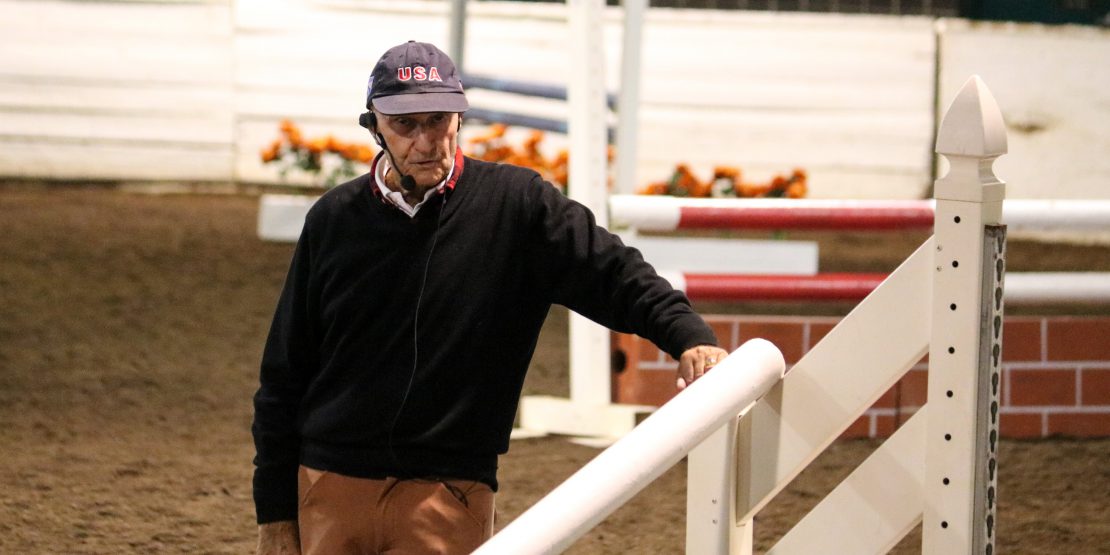“He is a legend,” says Gayle Lampe, a saddle seat professor emeritus at William Woods University.
George Morris has been called many things in his 79 years. Olympian. Author. Coach. Trainer. Hunt seat founding father.
Last April, this world-renowned equestrian visited William Woods to conduct a hunter/jumper clinic for students, alumni, and outside riders. He spent three days instructing horse-and-rider pairs in the Intermediate, Advanced Intermediate, and Advanced levels, with numerous auditors looking on. It was a competitive process to even be selected to ride in one of the 23 coveted spots. But only the strongest survive the exacting eye of Morris.
Equitation Lessons
“As a professor, it’s important to introduce my students to as many instructors and their teaching methods as possible,” says Michele Smith, the Hunter/Jumper professor at William Woods. “This was an opportunity for our students to learn from someone whom I consider the best hunter/jumper person in the country.”

“He’s the one you learn about from the moment you learn to jump,” says Jane Bond ’17, an Equestrian Science major from Manistee, Mich. who rode Voila (a Dutch Warmblood donated by Stephanie J. Wilson).
Grace Barnes ’16, a Park Hills, Mo. Equine Administration and Equine General Studies double major agrees. “It’s like a basketball player meeting Michael Jordan.”
And riders and auditors certainly learned many techniques during the event. Morris spent time emphasizing tips that are useful to all seats:
- “A happy horse is a disciplined horse”
- “Accuracy is better than speed”
- “The basics taught in Dressage will carry over into making your horse better, and will make you better as a rider”
- “Keep your hands high and your heels down”
- “A horse develops bad habits in seconds, but good habits take years”
- “People think they ride with their legs — only 1/10 of 1 percent actually do”
“Taking riding back to the fundamentals, even at the higher levels of the sport, is always so important to remember,” shares Jojo Levy Kyger ’07, MEd ’11, a WWU Equestrian Science major who is now a co-owner and trainer at Just Cruising Equestrian Center in Kingdom City, Mo. Kyger rode in the advanced group and loved every minute of the experience. “Morris emphasized the importance of doing your homework: your flatwork, lateral work, and anything you need to get your horse rideable.”

No Stirrups Day
During part of the clinic, Morris had participants ride with no stirrups and reins in one hand.
“This really forced me to ride off of my legs instead of my hands, which created a much more relaxed horse,” shares Vonla Glassman ’18, an Equine Administration and Business Administration double major from Glen Ellyn, Ill. “He had us jump the Liverpool without stirrups, which was pretty nerve-wracking. But after making it over the first time, my confidence went up and my horse went over it every time.”
Glassman, who rode Pass the Chip (an Appendix horse donated by James and Jennifer Young), said this day was the most rewarding. “I survived no stirrups with George Morris and I wasn’t sore the day after!”
Constipated Cats and Happy Horses
Morris is renowned for his blunt, no-nonsense approach. And the weekend wasn’t without some of his colorful phrasing, particularly when he compared a horse to a constipated cat. But overall, his passion for the equestrian field and his love of horses was evident.
“I wanted my students to come away with more insight and understanding in working with horses,” shares Smith. “George Morris likes happy horses, and he emphasized how to get along and work with your horse. They need to be disciplined, but in a way that makes the horse want to do it right the next time.”
Off the Horse
In addition to the practical clinic in the arena, Morris also gave a lecture on Friday evening in Dulany Auditorium. He talked about his career and how he started by taking riding lessons at a local barn. At first, his trainer didn’t think Morris had what it took to make it in the industry—he suggested he switch to tennis!
Over the years, Morris has distilled his experience into five elements for equestrian success:
- Ambition: Be realistic — are you going to compete in the Olympics, teach, run a barn, etc.
- Emotion: Never show your temper to a horse — have ice water in your veins
- Management: Know how to take care of your horse from top to bottom
- Selection: Pick the horse that’s right for you
- Talent: For Morris, talent is a distant fifth
“What I loved the most about Morris’ talk is that ‘Talent’ was his last quality,” says Mary Marcum Orr ’01, a saddle seat rider who won the 2008 Three-Gaited World’s Grand Championship title and co-owns High Caliber Stables in Greensboro, N.C. with her husband, Evan Orr ’01 (the first male to be accepted to WWU when the school became co-ed). “He spoke about how he could do so much more with someone who wanted to learn than someone who had a good feel and no desire.”
“This was a life-changing experience,” says Kyger of the weekend. “I was extremely happy that I participated and I can tell the difference in every single horse I’ve ridden since the clinic.”

A version of this article originally appeared in the August 2017 issue of Saddle & Bridle Magazine.

